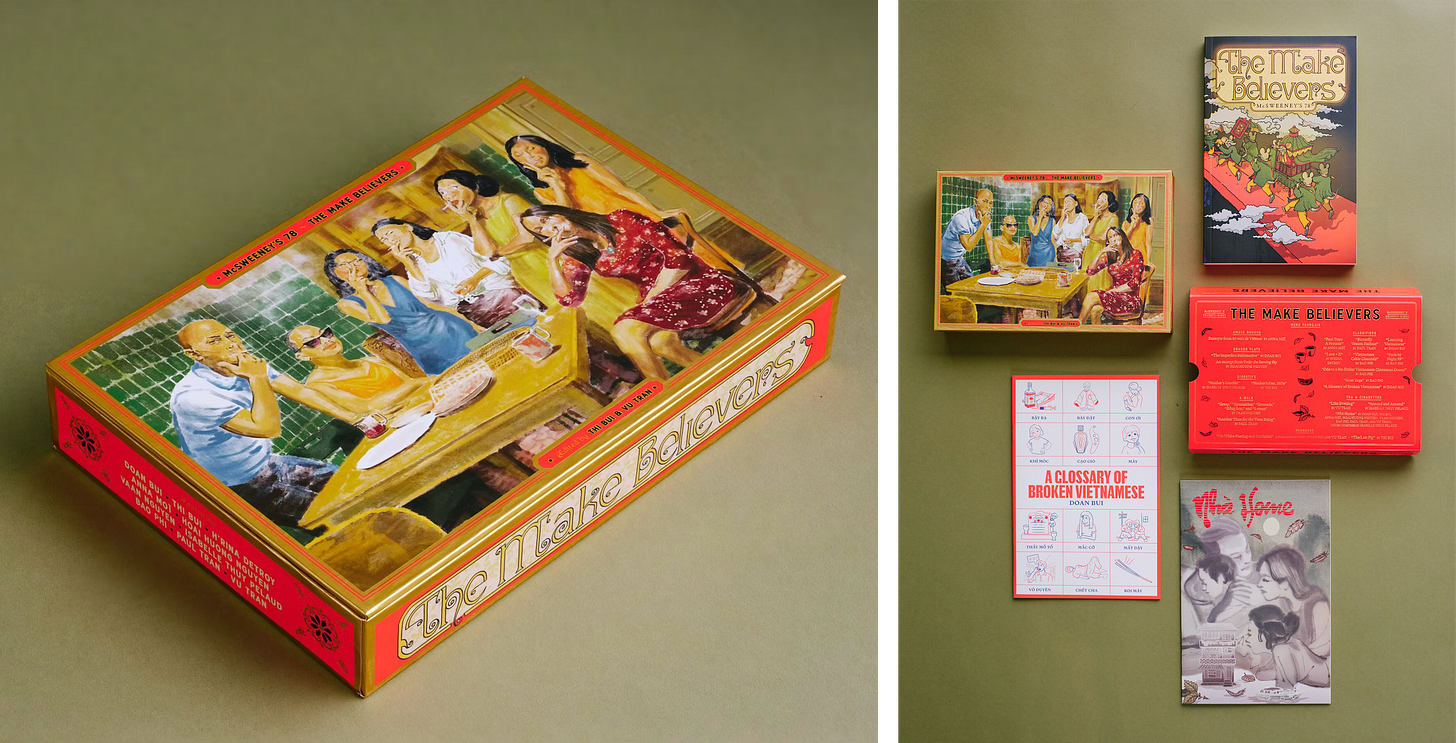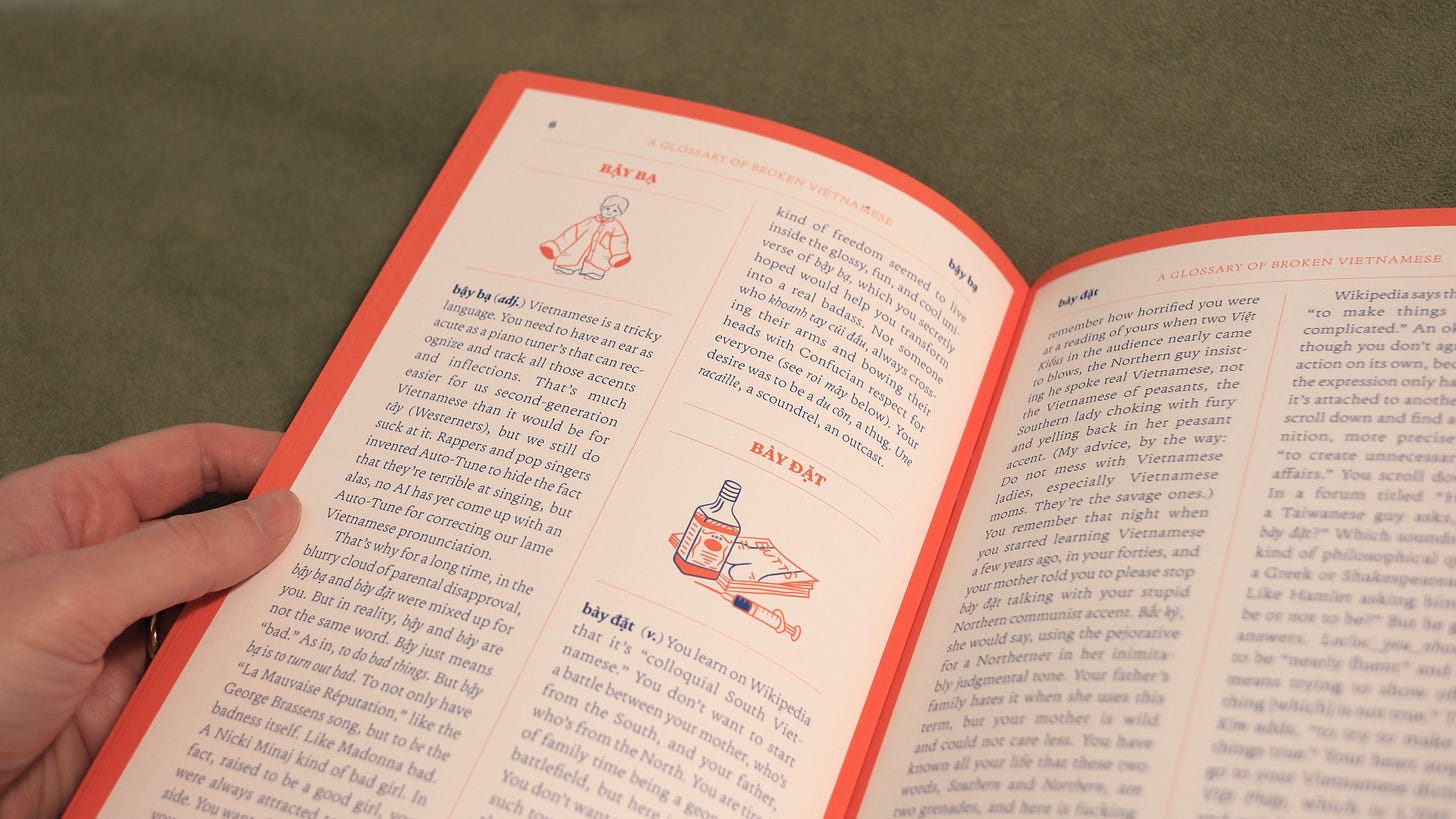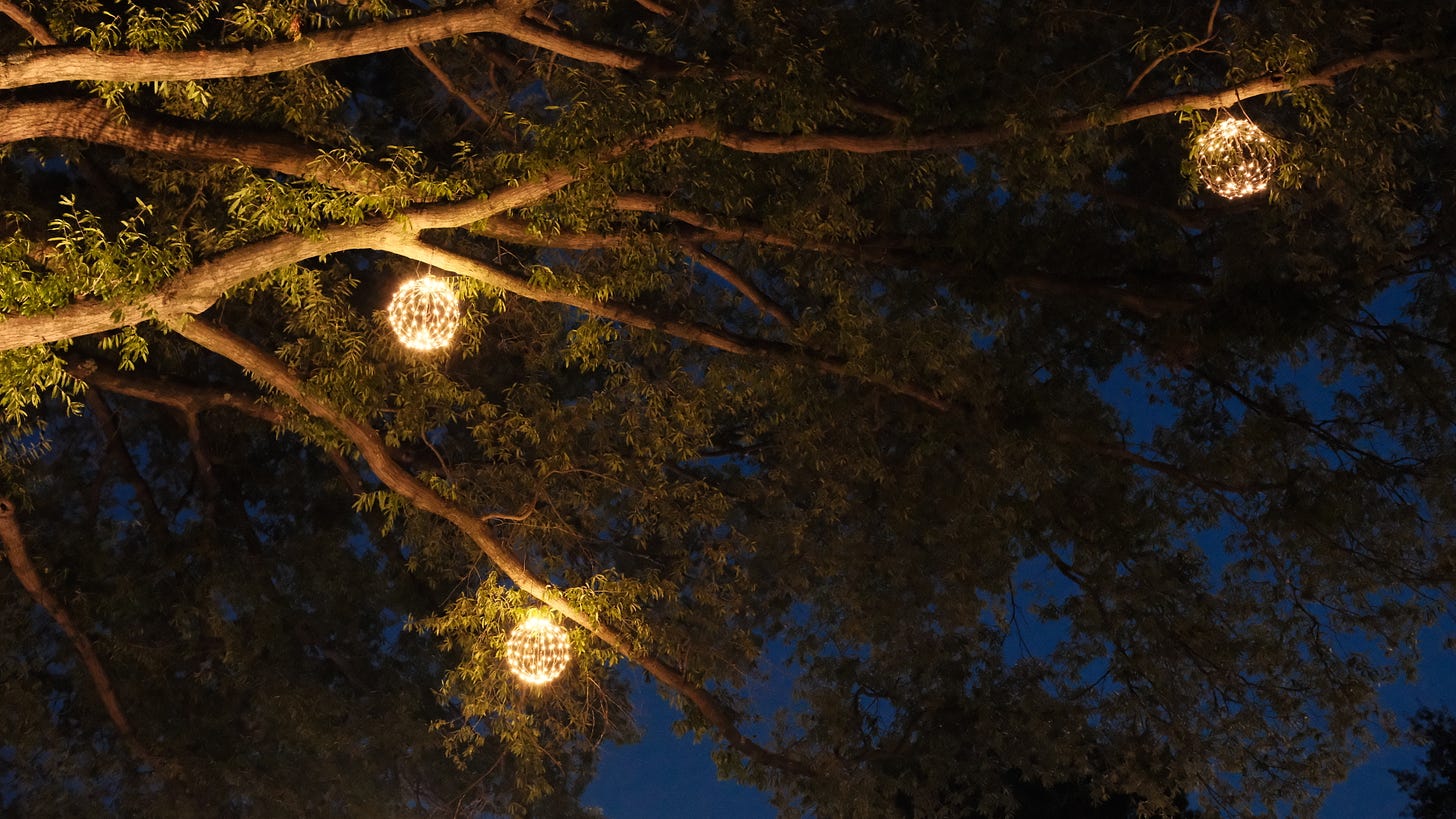Monday Miscellany: Pantsuit Sharon was right after all
Notes from July 21 - 27
At the moment it feels like everyone I know is currently under the weather or just getting over an illness, so if you happen to fall into one of these categories too, I’m sending healing thoughts your way! I think I’ve finally fully recovered from my own sickness, but our current heatwave has me hiding inside anyway. The “feels like” temperature on Saturday was 104F, whew. Here’s what I’ve been reading and watching during this indoor kid moment:
Read this week
McSweeney’s #78: The Make Believers arrived in the mail at the beginning of May, a beautifully-decorated cigar box with a book and two bonus booklets inside. This one is a themed collection, “a treasure box of writing from ten writers of the Vietnamese diaspora” who came together for a two-week retreat back in 2023.
There are stories, nonfiction essays, poems, and letters, varying in style and particulars but sharing themes of home, belonging, immigration, family, and language. My favorite piece was the final story in the main volume, “The Last Fig” by Thi Bui1—its beginning reads like nonfiction about the group’s residency, but soon there’s a mysterious fever and a murder and an instance of cannibalism and oh YIKES, I hope this isn’t how things actually went down.
One particularly fascinating detail that I noticed throughout the collection was the fact that there’s no one word for “I” in Vietnamese, that instead, the speaker self-references in different ways depending on their relationship to their conversation partner.2 Many of these writers, some of whom can’t speak Vietnamese well or at all, are grappling here with the connections between language and identity, language and heritage, language and shame. These ideas are particularly underscored in one of the supplemental booklets, “A Glossary of Broken Vietnamese” by Doan Bui, which is informative but also poignant and funny, another highlight of this issue for me.
The other booklet, “Nhà Home,” is a beautiful poem written by all of the contributors and woven together by Isabelle Thuy Pelaud, and it was the perfect thing to save for last as it ties the whole thing together in a lovely metaphorical bow.
After finishing the McSweeney’s I realized that I’d read through my entire list for July,3 meaning that I was free to browse my shelves and pick up whatever I wanted! No obligations? No deadlines? No due dates??
I decided to go with a short translated novel that’s been on my radar for several years, Diary of a Void by Emi Yagi (trans. David Boyd and Lucy North). My copy was a lucky $5 find at a used book sale a few weeks ago and I’d been itching to get to it.
This is the story of Shibata, a woman in her thirties who works in an office with mostly men and often ends up having to prepare coffee for clients, clean up after meetings, and keep the break room and other shared spaces tidy even though none of this is in her job description. She also deals with rude and problematic comments from her male coworkers on the regular. One day Shibata decides she’s had enough, and says no—no, I can’t gather up and throw away the dirty coffee cups, because the smell of coffee nauseates me, because I’m pregnant. Clean up after yourselves. The thing is: she isn’t pregnant! But the ruse continues long-term, and it allows her to stop doing many of the unpaid extra tasks she was formerly saddled with, to keep to herself and focus on her own work, and to go home on time at the end of the day instead of constantly staying late. I absolutely love this premise, and with humor, empowerment, and a sprinkling of magical realism, Emi Yagi nails the landing. What a ride.
From there I felt like swinging back toward nonfiction4 and chose David Sedaris’s memoir Dress Your Family in Corduroy and Denim. I could’ve sworn I’d read this one before, many years ago, but a scroll through my old Goodreads account says maybe not? I’m familiar with his other books from this era, at least (Me Talk Pretty One Day, When You Are Engulfed in Flames, etc) and this feels very akin to them in tone and content. He writes extensively about his family and their many faults and follies, and while many of the stories in this collection made me chuckle, there were some word choices and subject matter that didn’t hold up so well twenty years after publication. I’m thinking particularly about his observations of his sister Tiffany, who would go on to die by suicide in 2013—watching him joke about what he sees as her hoarder tendencies and run-down living situation feels icky now, knowing what we do in 2025 about mental illness. Still, Sedaris has a wry and distinctive sense of humor all his own, and if you’ve enjoyed his other work, you will likely find something here to admire as well.
If you purchase a book through the bookshop.org affiliate links in this post, I may earn a small percentage commission. This is an easy way to support my work at no additional cost, and I appreciate it very much—thank you! ♥︎
Watched this week
Honestly, I don’t know if I could describe Black Roses (1988) better or more succinctly than the imdb summary, so I won’t even try. “Demons hypnotize the general public by posing as a rock and roll band.” Yeah, that about covers it!
Think 1980s, small town, innocent youths who just want to attend their first rock show ever, and this one angry lady in a pantsuit trying to convince everyone that this music is evil and the devil is real. And then, after the kids fight for the concerts to go on as planned, OOPS, pantsuit Sharon was right after all and the sweet tunes of the Black Roses brainwash said young people into vandalizing cars, shooting their dads, seducing their teachers, and morphing into Black Crystal-looking evil muppet type creatures. Who will bring an end to the madness, and how?? You’ll have to watch this hilariously bad work of cinematic genius to find out.
(Starring Vincent Pastore from The Sopranos for like five whole minutes (during which he drops a jarring gay slur and has a suuuper convincing physical struggle with a strange creature who emerges from a hi-fi speaker), and Lou Ferrigno’s wife Carla in one of her six acting roles ever!)

Haiku round-up
Haiku is a poetic form that originated in Japan, containing seventeen syllables in a five-seven-five pattern. At the beginning of 2024, I started writing one every day, and while traditional examples include thematic reference to the seasons, mine tend to be a bit more all over the place. Here are this week’s efforts—enjoy!
Monday, July 21
Even slow progress is worth some celebration. Note those baby steps!
Tuesday, July 22
Imagine a day that begins with a good mood and ends the same way
Wednesday, July 23
Mourn dead greenery by planning a landscape of native, unkempt joy
Thursday, July 24
These conversations, this vibrant community— Reasons to persist
Friday, July 25
Small pockets of time have adventure potential if you’re efficient
Saturday, July 26
A simple delight: putting on a mix CD, turning it up loud
Sunday, July 27
At last, reunion Laughing like an idiot with friends who get it
Until next time
Since reading Life in Three Dimensions a few weeks ago, I’ve been trying to identify moments when I’m choosing between contentment and psychological richness, the guaranteed happiness of an easy or known option and the potential friction but possible reward of an unknown one, and to stretch myself toward the latter a little more often. This past Saturday I had the chance to tag along with a couple of friends to see another friend’s band’s outdoor gig, which started at 9pm, in Greensboro (a 30-minute drive). Alternately I could’ve stayed home and enjoyed having the house to myself, making something delicious for dinner, winding down with a book, and maybe turning in early. The well-worn and familiar option is always so tempting! But I went, and I’m happy I did. The show took place on a brewery’s back patio under an enormous tree strewn with globes of fairy lights, and it was such a pleasure to lounge in an adirondack chair and sip a beer while we listened. Plus, since we carpooled, I got to catch up and laugh with my people on the way to and from.
As usually happens when I go for the unknown or slightly inconvenient thing, the experience was a lovely and memorable one, the choice a no-brainer in retrospect. May I remember this the next time such a choice comes along. Psychological richness for the win.
See you next Monday, and until then, wishing you this level of relaxation.
♥︎ Emily
You might know this name from her illustrated memoir, The Best We Could Do, which is excellent.
“With your parents, you call yourself con and address your mother as má or me or bu, your father as ba or bô or cha. You call yourself em with your older brother, whom you call anh, and also with your older sister, whom you call chi. […] What kind of ‘I’ should you be, and what kind of ‘you’ is the person you’re talking to? The answer can be so uncertain that sometimes you just end up saying nothing.” (A Glossary of Broken Vietnamese 12)
Thanks, Covid!
So far this month, 8 of the 13 books I’ve read have been nonfiction—I’m on a roll, y’all.







